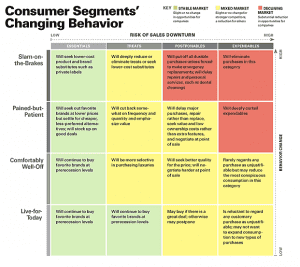|
Getting your Trinity Audio player ready...
|
Having used to speaking about breakthrough technologies and powerful trends that transform doing businesses worldwide, we would never have assumed we would speak about a pandemic as a key driver of such transformation.
Now, when Coronavirus is daily multiplying the number of the affected companies and families, and the IMF has officially declared having entered a recession – “as bad or worse than in 2009”, the big “Now what?” question is chasing millions of entrepreneurs.
While the question is paralyzing to many, the answer to it is clear.
Stay calm and take action.
This our post is not to spread fear, nor to dwell on how bad and unexpected the challenge is, but to leverage our own experience and insights of key experts in the field of recession marketing to provide practical tips that will help you take the right action.
The Effect of Coronavirus on Marketing
Coronavirus has caused an economic recession, but it is not like any of the economic recessions we have been through. Let’s draw a quick comparison:
- Closures, lay-offs, and lower spending power. Just like during the recession of 2008, we are going to see many closures of businesses that would trigger massive layoffs. Consequently, some people will lose most of their spending power, while others will restrain from unnecessary purchases. This will require all companies to adopt various aspects of a marketing strategy to the new market conditions, whether the sudden lockdown damaged or favored their sales.
- The uneven impact on industries. Coronavirus has a great impact on marketing and ecommerce, but this impact is not even. While hotels, restaurants, travel and entertainment businesses are hit the hardest, mobile games and cloud technologies are facing a real boom in searches and conversion.
- Supply chain. Coronavirus has placed a supply chain under considerable strain, which can make going out of crisis even more painful. In fact, experts predict that when COVID-19 and the associated global supply chain disruption is under control, it will still take large companies three to six months to get back to normal.
- Request for social responsibility. Reduced trust in politicians have long been urging consumers to rely on companies to take action in societal issues. Now, when tampering recession is directly linked to containing the virus, there is an even larger request for companies to go beyond words towards social action.
COVID-19 did cause a large social and economic unrest. Even if your business has not yet perceived any grand changes, it is not the time to go on business as usual. Instead, it is the time to learn previous recession marketing lessons and adopt your strategy to marketing in the age of Coronavirus. Here are the 5 important steps to take.
1. Research Your Target Audience Behavior
What has been true about your business and target audience a few weeks ago – is likely not true anymore. However, it is important not to jump at hasty conclusions that consumers would not buy luxury products or more expensive products from popular brands. In fact, in times of uncertainty, people prefer to stick with the brands they know and buy more expensive yet durable and valuable products.
To be ready to fine tune your marketing efforts and avoid taking wrong decisions, start with a thorough research. Here, it is useful to look at the Consumer Segments’ Changing Behavior matrix presented in Harvard Business Review back in 2009.
According to it, all consumers can be divided into four categories:
- Slam-on-the-brakes: consumers that are hardest hit financially and try to reduce any type of spending
- Painted-but patient: are optimistic about the eventual recovery and try to minimize ongoing expenses
- Comfortably well-off: feel secure in term of overcoming the current and future recessions, but still become more selective when making a purchases
- Live-for-today: remain unconcerned about the saving and maintain the same consumption behavior unless they become unemployed
Each of the group will define your product or service as belonging to one of the following categories:
- Essentials: items that are necessary for survival like food, medication and personal care products
- Treats: justifiable indulgences
- Posponables: desired items, which purchase may be postponed
- Expendables: unnecessary and unjustifiable purchases
Thus, you need to research where your target audience and your product fall and adjust your strategy accordingly (for example, focusing on the products that still sell, justifying the reasons to buy postonables, or presenting your products as treats rather than expendables):
2. Do not Cut, yet Optimize Your Marketing Spending
Cutting marketing expenses is a wrong move: in each recession cycle, brands that had a strong brand presence managed to come out of it on top. Now, when the competition for the customers increases and defines the sustainability of your business, it is even more important to invest into marketing.
After all, “A man who stops advertising to save money is like a man who stops a clock to save time.” – Henry Ford
“A man who stops advertising to save money is like a man who stops a clock to save time.” – Henry Ford
Thus, instead of refusing from the marketing services, make sure you consider your investment more scrupulously, track the results of each campaign and analyse carefully the return on investment.
The following recommendations will help you optimize your advertising campaigns:
-
Select what products to advertise and optimize descriptions
As mentioned above, the time of recession makes customers seek value, durability and recognizability of the product. It is a good thing to optimize product portfolios and marketing copies accordingly. Restrain from implementing or marketing ad-ons and nice-to-have features; instead, advertise your well-know products with proven performance.
-
Adjust pricing tactics
Customers will be looking for the best deals. Here, it is necessary to hamper creativity and attend to recession marketing insights too. For example, in tough times, price cuts and quantity discounts are favored over smart lotteries and other types of promotions. Consumers prefer to see products unbundled and priced separately. More aggressive pricing on small pack sizes would be also a good incentive for customers to consider larger size alternatives.
-
Adjust your marketing copy and imagery
John Quelch, a prominent business analyst, teaches, “When economic hard times loom, we tend to retreat to our village.” What he means is that people start appreciating coziness and family focus in your ads averting from the portrayals of extreme sports, risk, and zany humor. Using the emotional appeal on the basis of fear is not preferred either. Even if such a campaign brings you the revenue, it can harm the brand image in the long run.
Also, avoid common slogans that might sound quite chilly now, like “March fever”, “going viral” or “Buy before it’s too late”… Look through your old well-performing content to spot anything that may provoke wrong associations too. For example, once successful headline “Marketing Tactics so Contagious, Even a Professional Isn’t Immune” looks like an epic fail for marketing in times of Coronavirus.
-
Sell and connect to customers online
It is not a secret that Coronavirus has made all companies move online. As more and more offline businesses embrace e-commerce, online competition is becoming more intense. Still, this is not the reason to avoid it. On the contrary, it is the reason to embark on it as soon as possible. More on that further.
3. Create or Update Your Digital Marketing Strategy
Whether you are just coming to grips with digital marketing or have been selling online for quite a while, it is important to understand the major trends that affect online marketing during the Coronavirus outbreak:
- PPC campaigns can help you target customers with conscious needs. Still, clicks are going to cost more and bring less conversion, as the reduced spending power will make customers more selective.
- One of the key advantages of digital marketing to use now is the ability to retarget the customers that have already interacted with your brand – during the recession, interest in new products and brands fades and the existing customer base makes the best performing audience.
- Those companies that invested in search engine optimization are like people who cherished healthy living and invested in their immunity system – both are better prepared to tackle today’s hazards. If you haven’t done any SEO, it is high time to start optimizing your website for basic SEO requirements and learning the latest SEO trends.
- The times of uncertainty and inability to come and touch the product or visit a partner bring trust to the first place. Thus, social selling techniques (social listening, branding, content marketing, direct interaction with potential customers) are predicted to bring the most results in the near future. And you should better capitalize on these techniques.
- Amidst the pandemic, people try not to leave home and search for nearby destinations for products and services. This is a good reason to leverage local SEO and optimize your website for “near me” searches.
4. Develop a Coronavirus conversation strategy for your brand
To speak [about Coronavirus], or not to speak, that is the question tormenting most of the brands now. While some companies send another “troubled yet hopeful” email or change their logos to communicate the need of social distancing, marketing experts suggest that “the best Covid communications over the next five treacherous months is no Covid communications at all”.
“the best Covid communications over the next five treacherous months is no Covid communications at all”.
There are several reasons for that:
- First, Coronavirus is becoming a too much sensitive topic and the news is so overwhelming that customers start feeling fatigue with it. In fact, most customers now want not to hear about it and get some distraction and entertainment instead.
- Second, Erik Gordon, professor of marketing and business at the University of Michigan, warns that customers tend to retain the link between the two things for a longer time while forgetting the details. This way, avoid making a persistent link between your brand and a pandemic, as it will lead to unconscious association and aversion from the brand, even if the details are about doing something positive.
- Third, a wrong move may trigger negative social or legal consequences. On March 9, the Federal Trade Commission and Food & Drug Administration issued warning letters to seven companies that were making deceptive or unfounded claims about treating COVID-19 in their ads, and attention to such claims is getting even more intense.
At the same time, there is some necessary coronavirus conversation to engage in: giving clear and straightforward information for your customers about your current working practices and ongoing communication with the employees. Do devote much attention to this.
5. Take action without turning it into a marketing campaign
As mentioned above, customers expect enterprises to step in and tackle social issues. And lots of companies actually respond to Covid with great humanitarian campaigns, make large investments to create a better environment for their employees, and take action to postpone the layoffs. Such moves matter a lot, even if not widely publicized.
In those challenging times, companies do get a unique opportunity to build trust and positive feelings around their brands both in their customers and employees. The condition is for the moves to be genuine and not primarily focused on self-interest.
Instead of Afterwards
Sooner or later, we would learn to tamper corona and live with it without suffering any losses. Hopefully, it would also teach us to be more appreciative of our families, employees, and endless marketing opportunities.
From all of us at Rioks, maintain good health, integrity, and exemplar recession marketing.













